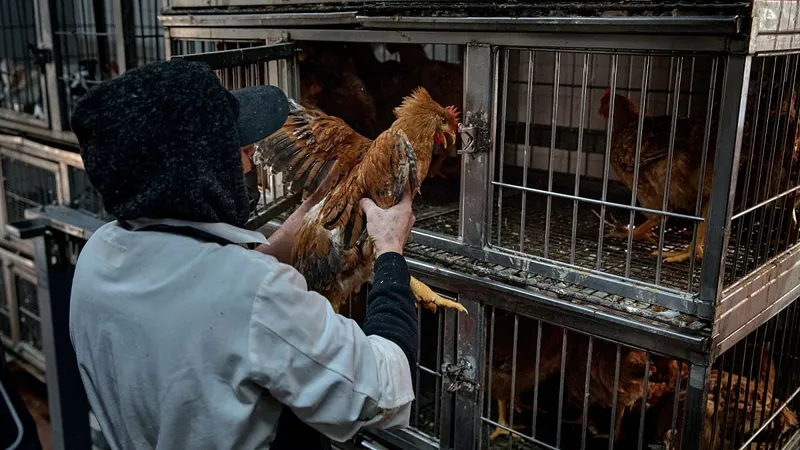
Urgent Action Required as UN Warns of Intensifying Bird Flu Threat to Global Food Supply
2025-03-18
Author: Siti
Urgent Action Required as UN Warns of Intensifying Bird Flu Threat to Global Food Supply
In a stark warning that has sent ripples across the agricultural sector, food and agriculture experts from the United Nations have raised alarms over an escalating bird flu crisis, as the H5N1 virus continues to ravage poultry populations and spill over into other animals and humans globally.
During a recent conference in Rome, officials from the Food and Agriculture Organization (FAO) urged member nations to prioritize enhanced disease monitoring, stringent biosecurity protocols, and effective outbreak control measures to combat this looming crisis. The call to action comes as the avian influenza virus has demonstrated alarming adaptability, not only wreaking havoc among wild bird populations but also affecting mammals, including a significant outbreak observed among dairy cattle in the United States since last year.
FAO Deputy Director-General Godfrey Magwenzi articulated the dire consequences of this outbreak, stating, “The spread of the virus among birds is leading to serious impacts on food security and food supply in countries, including the loss of valuable nutrition, rural jobs and income, shocks to local economies, and, of course, increasing costs to consumers.” This growing concern highlights the multifaceted nature of the challenges posed by the H5N1 virus.
Since 2021, approximately 300 species of wild birds have been affected by the virus, with experts emphasizing the urgent need for improved disease surveillance and biosecurity measures. Additionally, there is a growing discussion about the potential implementation of vaccination strategies to mitigate the public health risks associated with bird flu.
The situation is not limited to poultry; there have been significant incidents involving zoo animals, cats, and various wild species. Alarmingly, human cases are also on the rise, with the United States reporting its first human fatality due to bird flu earlier this year and confirming a total of 69 infections linked to the H5N1 strain. The UK has also experienced human infections, including one case attributed to close contact with infected birds.
Despite no evidence of sustained human-to-human transmission at this stage, health officials in Europe maintain that the risk to public health remains relatively low. However, recent studies have unveiled 34 genetic mutations in the virus, raising concerns about its potential to adapt and spread among human populations more effectively.
In a proactive response to the situation, the UK government has begun stockpiling five million bird flu vaccines for humans, preparing for any possible evolution of the virus that could enhance its infectiousness among people, potentially triggering a pandemic scenario.
Beth Bechdol, another Deputy Director at the FAO, stressed the importance of international cooperation in controlling the virus, stating, “A chain is only as strong as its weakest link.” This sentiment underscores the interconnected nature of global public health and food security and the urgent need for collaborative efforts among nations to curb the threat posed by bird flu.
As the situation develops, it is clear that the stakes are high, and immediate action is necessary to protect food supplies, public health, and livelihoods around the world. Will global leaders unite in time to combat this formidable threat, or will the consequences escalate further? Only time will tell.

 Brasil (PT)
Brasil (PT)
 Canada (EN)
Canada (EN)
 Chile (ES)
Chile (ES)
 Česko (CS)
Česko (CS)
 대한민국 (KO)
대한민국 (KO)
 España (ES)
España (ES)
 France (FR)
France (FR)
 Hong Kong (EN)
Hong Kong (EN)
 Italia (IT)
Italia (IT)
 日本 (JA)
日本 (JA)
 Magyarország (HU)
Magyarország (HU)
 Norge (NO)
Norge (NO)
 Polska (PL)
Polska (PL)
 Schweiz (DE)
Schweiz (DE)
 Singapore (EN)
Singapore (EN)
 Sverige (SV)
Sverige (SV)
 Suomi (FI)
Suomi (FI)
 Türkiye (TR)
Türkiye (TR)
 الإمارات العربية المتحدة (AR)
الإمارات العربية المتحدة (AR)